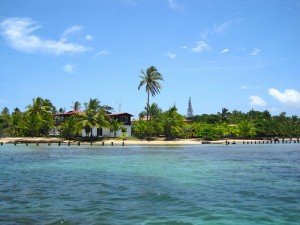
(International Living) Sixty-two-year-old Neil Sander knows how to get things done. Throughout his seven years in Panama’s island-rich Bocas del Toro region, this Oklahoma-born pioneer has taken the bull by the horns more than once. The key to his success? “Respect,” he says.
“Respect gets you further than money on any of your projects. The Panamanians have some age-old ways of doing things, handed down from generation to generation. Respect them, and earn respect for yourself by being quietly patient when things take a little longer. Having an attitude just gets you the run-around,” Neil explains.
It’s worth listening to Neil’s advice. He created the region’s first manufacturing operation, has managed many public and private construction projects, became the fastest supplier of quality building materials to the islands along the Almirante Caribbean coast…
…And you’ll find the cheapest drinks in Bocas Town in his floating bar, a converted old shrimp boat.
Neil fell in love with the Bocas del Toro region of Panama when he first arrived in 2004. “There’s much less government control and regulation—there are laws, but officials go by common-sense enforcement rather than the letter of the law.”
The word tranquilo (“calm” or “relaxed”) describes the laid-back way of doing business. “People here are friendlier and more relaxed…they are more content with what they have,” says Neil.
Neil first came to Bocas for an “interesting and different” opportunity to install a retirement community on nearby Isla Bastimentos. He arrived with two suitcases and the energy of a man half his age. “I was the first guy in, laying out the road system with a machete,” he says.
At 55 he was hired because of his related project-management and accounting experience, plus his business-analysis skills. In those early days, as he listened to fellow expats complain about the way things get done in Panama, he found that the major complaints centered on getting construction jobs completed on time and with worthwhile materials.
Everyone wanted their places finished yesterday, and to quality standards. Thus, Neil’s company, Casa Depot SA, was born a year later. He is now the major supplier of locally-obtained construction materials. “I couldn’t get wood milled to standard, so I built a saw mill and hired a skilled Panamanian to teach the craft to locals. I couldn’t get decent cabinets delivered quickly, so I built a cabinet-making shop and staffed it with locals who had the feel for wood.”
To move materials around the coastline, Neil had a 60-foot-long dugout canoe (called a cayuco) hollowed out from one enormous tree and transported through the jungle to the ocean by over a hundred men from three villages. His warehouse at Punta Robalo delivers supplies where trucks can’t go; the canoe’s capacity is 15 tons. Respect for local customs earns him necessary cooperation from the locals—plus he pays and delivers on time, rain or shine.
For his next project, Neil is converting an out-of-service Staten Island ferry into a floating resort and casino. And Neil sees plenty of other opportunities for aspiring expat entrepreneurs. In Bocas Town he thinks someone could import bicycle rickshaws for local Panamanians to operate on a rent-to-own basis. It would improve the ambience and reduce the emissions from the diesel-run taxis hauling tourists around.
Another idea linked to tourism is souvenirs. Neil notes that almost all souvenirs are made elsewhere. His favorite souvenir idea, and one he would be happy to help set up as his way of giving back to local people, is developing livelihoods from waste.
As he says, “Lumber operations leave to rot anything above where the first branches cut into the smoothness of the trunk. Yet this is the wood with the pretty burls and crotches, ideal in carved bowls, plates, clock faces, etc.”
Neil thinks that if treadle-operated lathes were imported for villagers, they could create high-quality craftwork to sell for profit in consignment shops.